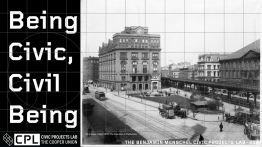Civic Expression, People, Place, and Perspectives
Thursday, April 24, 2025, 3 - 4pm

2025 is emerging as a uniquely complex year for civic expression and identity. Geopolitical constructs are in flux, and norms are being recalibrated across various sectors of society. This moment of complexity requires a nuanced engagement with these shifting landscapes. The heartbeat of the civic corpus must be measured by different means and attuned to other readings. Mokena Makeka, director of The Cooper Union Benjamin Menschel Civic Projects Lab (CPL) will be in conversation with Jocelyn Formsma, CEO of the National Association of Friendship Centres, on civic expression, people, place, and perspectives. The conversation will be recorded for a new podcast, CIVICBEAT, produced by the CPL.
Registration on EventBrite is required. However, an EventBrite ticket does not guarantee entry as this is a first-come-first-served free event.
Jocelyn Formsma’s career exemplifies the revolutionary power of bringing people together in positive ways. Passionate about the rights of Indigenous people, Formsma has advanced reconciliation at multiple levels with many groups in different venues across Turtle Island and around the world. She served on the Nishnawbe Aski Nation Youth Council and the Chiefs of Ontario Youth Council, also working for the First Nations Child and Family Caring Society of Canada. After graduating with a juris doctorate from the University of Ottawa, Formsma was called to the Bar of Ontario and worked as a lawyer for a First Nations-owned law firm. She also served as a board member of the Indigenous Bar Association and was an advisory to the Ontario Indigenous Youth Partnership Project. The youngest-ever Chairperson at the Aboriginal People’s Television Network, Formsma is also a trustee of the Canadian Museum of Human Rights. She was chosen to join the Deputy Prime Minister’s Task Force on Women and the Economy. Her commitment to child welfare is both national and international in scope, and sits as a board member on the National Indian Child Welfare Association (NICWA) and was one of two Canadian delegates selected by the World Economic Forum (WEF) to join the Young Global Leaders Community, an international community of exceptional young leaders.




